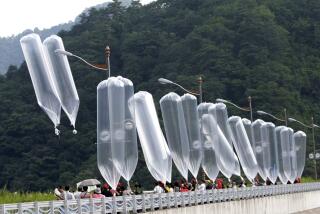Improving Security, Reducing Risk of War
- Share via
The question everyone seems to be asking about North Korea’s communist regime is: When will it collapse? It is the wrong question. There is no way of knowing, and asking it distracts attention from the right questions: What do we want to avoid in North Korea, collapse or no collapse, and what, if anything, can we do about it?
Above all, we want to avoid war. We nearly stumbled into one in June 1994, during the nuclear crisis with North Korea, when President Clinton approved the dispatch of substantial reinforcements to Korea, a fateful step that was likely to trigger mobilization by Pyongyang and risk war neither side wanted. Incidents like the recent firefight after South Korea shot at a handful of North Korean soldiers who had crossed into the demilitarized zone should remind us that the lives of 37,000 American troops and their dependents and millions of Koreans remain in jeopardy.
Four-party talks among the United States, North and South Korea and China, which began Tuesday, could do much to reduce the risk of war on the peninsula. That, not a peace treaty to write a formal conclusion to the Korean War, is the main point of the talks. It will take sustained political engagement and reciprocity by Washington, Seoul and Pyongyang to avert a military tragedy on the peninsula.
To deal with incidents along the DMZ, North Korea wants a new communication channel to replace the outmoded Military Armistice Commission. Other confidence-building measures could include a hot line and advanced notice of military exercises. But the confrontation won’t be defused without more far-reaching steps like limiting the size of exercises, sharing intelligence to dispel dangerous misperceptions, pulling back and thinning out forward-deployed forces on both sides and negotiating force cuts.
North Korean officials privately have expressed interest in such measures. North Korea wants to reduce its defense burden, but it cannot do so without reciprocal steps by South Korea and the United States, which have military superiority. Moreover, Pyongyang no longer insists on the withdrawal of all U.S. forces from Korea. Quite the opposite, it wants some troops to remain as peacekeepers, reining in South Korean forces.
Contrary to the conventional wisdom in Washington, South Korea, not North Korea, has been reluctant to engage in talks ever since the death of North Korea’s longtime leader, Kim Il Sung. In the fall of 1996, for instance, a North Korean submarine ran aground off South Korea while apparently dropping off spies on a reconnaissance mission. Such spying is routine among states, as shown by the arrest of South Korean spy Robert Kim within days of the submarine’s discovery. Yet South Korea accused North Korea of mounting a “commando raid” as a prelude to all-out war and exploited the incident to hold up groundbreaking for a new nuclear reactor in the North to be constructed under the October 1994 Agreed Framework. That delayed moves tied to construction of the reactor: removal of five or six bombs’ worth of plutonium in spent nuclear fuel now in North Korea and International Atomic Energy Agency efforts to determine how much plutonium the North may have reprocessed in the past.
Seoul also prevailed on Washington to postpone talks with Pyongyang on ballistic missile curbs. South Korea came around to accepting four-party talks only after President Clinton held up a planned visit to Seoul.
Another question people in Washington have been asking is whether Kim Jong Il is in power in Pyongyang. That has fed the South’s campaign to destabilize the North rather than deal with it. Instead, we should be asking whether it is possible to cooperate with North Korea to improve security on the peninsula. Based on what we have learned since the October 1994 Agreed Framework, the answer is a qualified yes.
American dealings with North Korea in the 1990s show that if we ask the wrong questions, we will get the wrong answers. To succeed in Korea, we have to start by asking the right questions.
More to Read
Sign up for Essential California
The most important California stories and recommendations in your inbox every morning.
You may occasionally receive promotional content from the Los Angeles Times.













